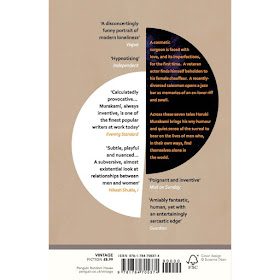"It's quite easy to become Men Without Women. You love a woman deeply, and then she goes off somewhere. That's all it takes."
'Men Without Women', I studied the cover closely before reading. The cover, two semi-circles, one black and one white, moving away from each other, was on-your-face simple. It clearly spelled out what to expect from the book. The book consists of seven short stories that are bound by the common thread of loneliness. Even though the title pretty much summarises the theme, each story presents a different facet of human experience and a different kind of loneliness. So also said the back cover.
Invariably, all the men who lost their women in these stories are lost souls. Their loss, sometimes actual but most of the time perceived, makes them act in strange ways.
In the opening story 'Drive My Car', a character actor makes friends with his late actress wife's secret lover to understand her motivations for adultery.
In the story 'Yesterday', an aimless boy, unsure of his future, tries to connect with his long time girlfriend with his best friend.
'An Independent Organ' is about a womanising plastic surgeon who finally falls in love with disastrous consequences.
In 'Scheherazade', a woman who brings provisions to a man in hiding tells bizzare stories from her past, like the main character of The Arabian Nights, and makes love with him. The more immersed he gets in these stories, the more he realises that she may be lost to him.
'Kino' is the story of a divorced salesman who opens a jazz bar only to realise his past is catching up on him in more ways than he can imagine.
'Samsa in Love' starts as a parody of Kafka's 'Metamorphosis' and evolves into a tale of primal love that offers no future prospects.
The last story, 'Men Without Women', takes the readers on a full circle. In it, a stranger calls the protagonist at midnight to inform him about his wife's, the protagonist's old girlfriend's, suicide. He realises that, with the final loss of his one-time girlfriend, who loved elevator music, he is now one of the Men Without Women. With the loss of that one woman, he understands that he has lost them all.
The seven stories are arranged in an ascending order of weirdness. The initial stories feature regular settings, and each story pumps up the weirdness scale a few notches higher. We also find several regular Murakami tropes, like a lot of musical trivia, magical realism, a streak of humour that takes some time to fully register, and some existential pondering on relationships, abundant in these stories. Another element that surprised me were the clever deceptions and distractions in the stories. Many of the stories evolve very differently from what we predicted at the beginning. A careful evaluation of some stories reveals that we are not given the entire facts and only a single point of view, which need not be even right.
I have frequently encountered this opinion in the books by Murakami that he fails to portray the ethos of his female characters. I never felt it till now, but after reading this book, I kind of understand the probable reason for that criticism. In this book, the female characters are shoddily portrayed. On the first reading, we may feel that Murakami doesn't understand women. But anyone who has read 'Norwegian Wood' will know that it isn't so. The stories in this collection are centred on men who lost their women. For most of them, this happened due to their own inherent lack of understanding of women. They are failures in their quests and losers, even sometimes when they maintain their relationships. Their failure to comprehend the ethos of women reflects in these stories.


No comments:
Post a Comment
Appreciate and enjoy your comments! Always wonderful to get feedback! The interaction with you is the most rewarding thing! Please do write your name too..
Thank you!
Happiness Always!